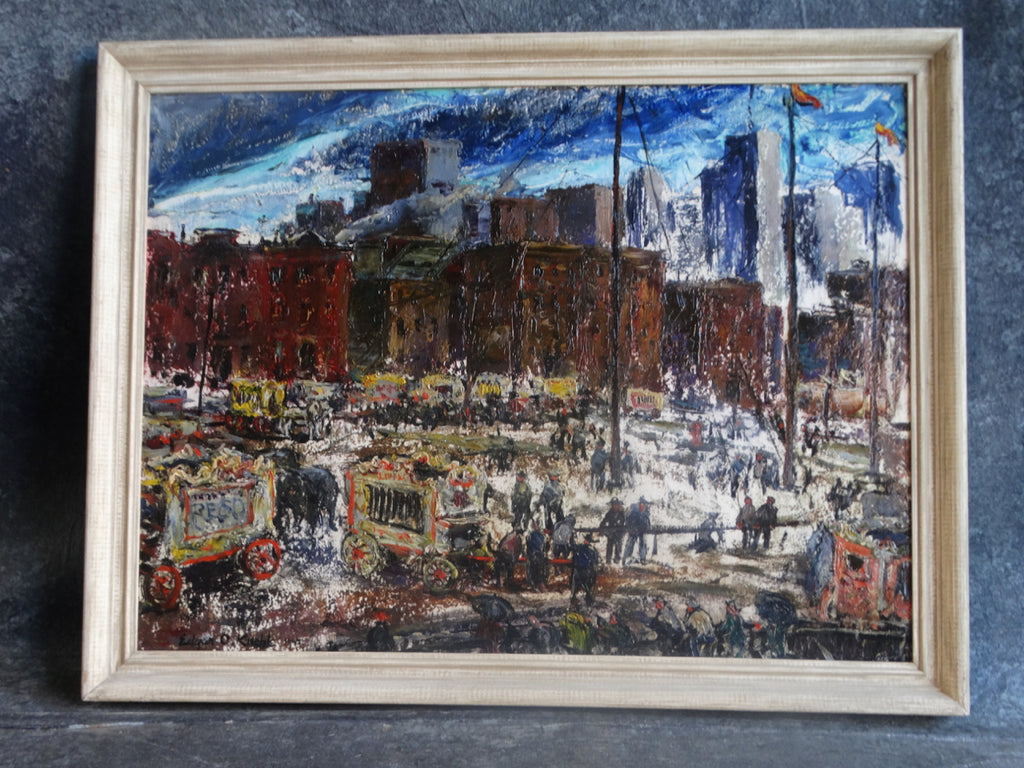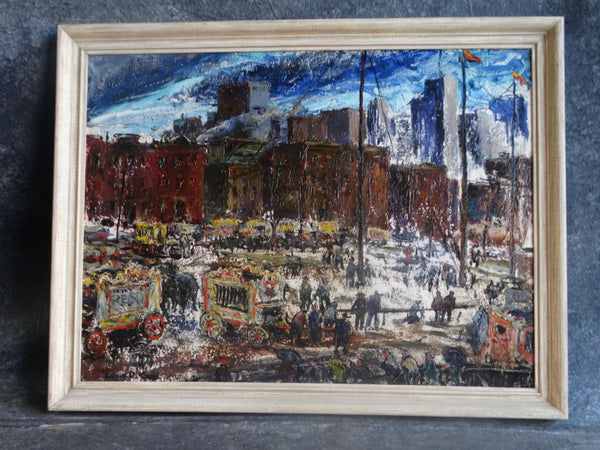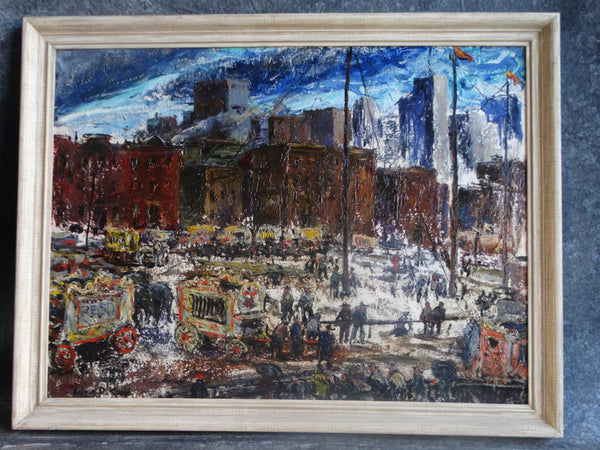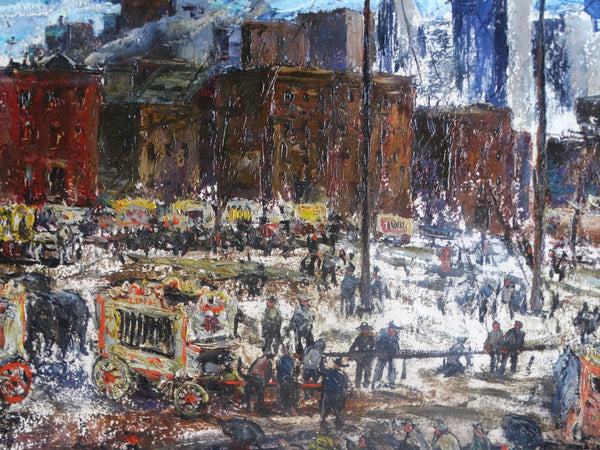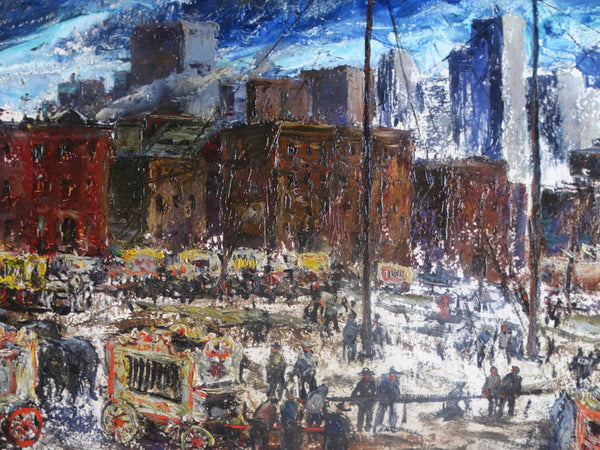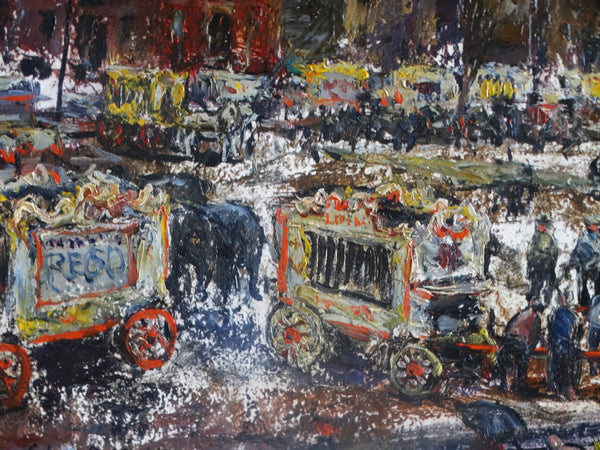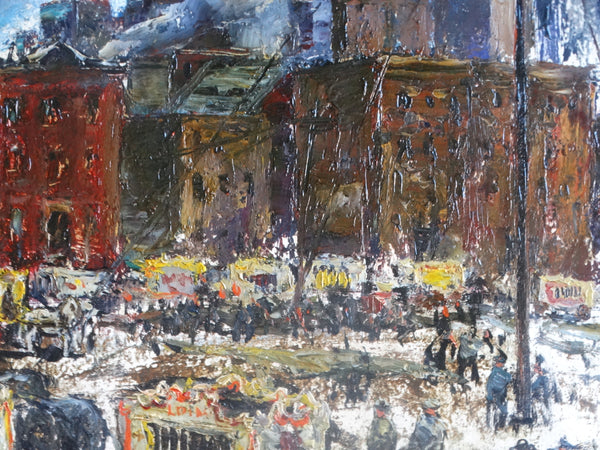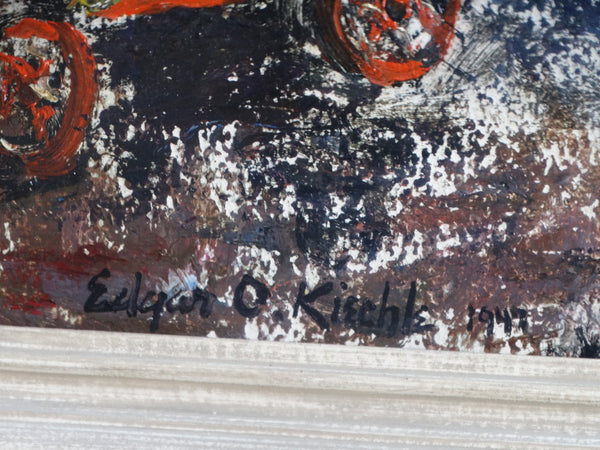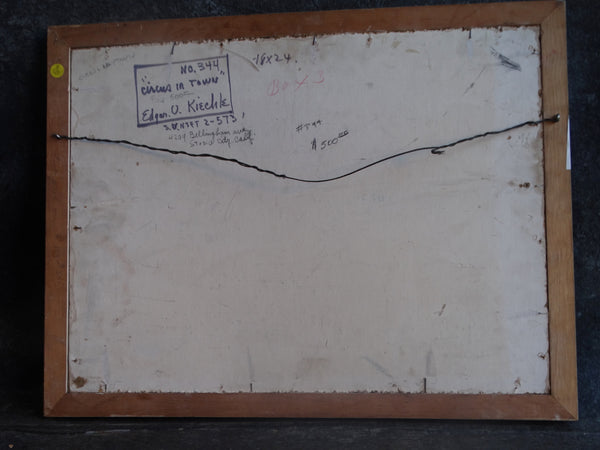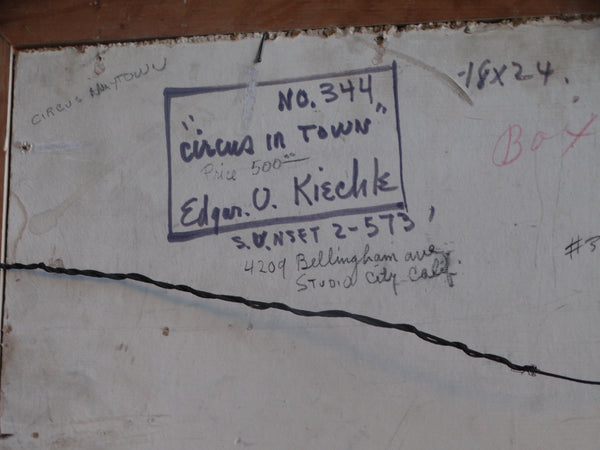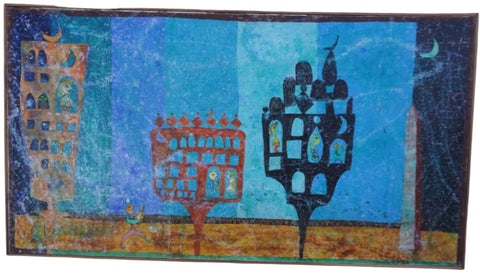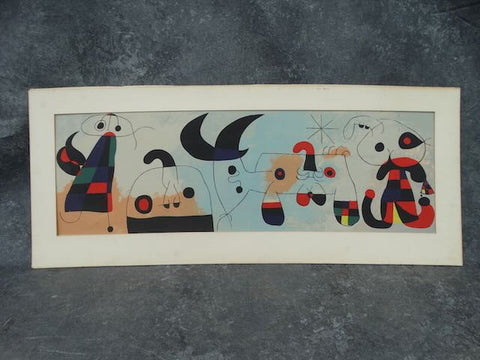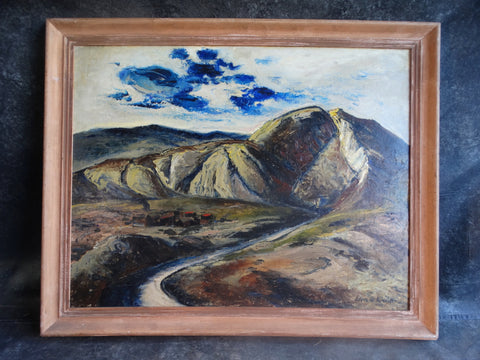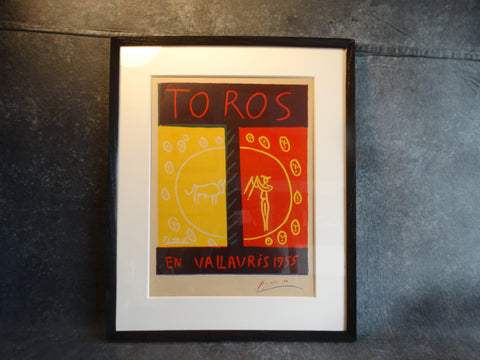Edgar O Kiechle
Edgar O Kiechle (1911-1960) - Circus in Town Oil on Board circa 1947 P3074
Regular price
$3,200.00
This is really a sensational painting, and, to borrow the hyperbole of the big top, frankly stupendous: so much life and movement and real observation.
Board measures 15" x 22".
Following is a biography from Paula Kiechle Kerris, daughter of the artist:
Edgar O. Kiechle was born in St. Louis, Missouri, on January 24, 1911. The family moved to Hollywood, California, in 1919. His father, Otto Anton Kiechle, was a painter of stained-glass windows and later painted background sets in the early movie days. He noted Edgar's interest and ability and was his first teacher of art. Encouraged early in his desire to become a painter, Edgar studied landscape painting with Jean Mannheim, and architecture, and became an excellent water colorist. After studying at the Otis Art Institute in Los Angeles, he interned with leading architects and designers of the area.
In 1933, Edgar joined the legenday animator Ub Iwerks as a background artist and worked on many films produced at Animated Picture Corporation through 1935. From Iwerks Ed found a home with Walter Lantz at Universal Studios and was the main background artist with Mr. Lantz from 1939 through the spring of 1941.
It is noted that the most incredible backgrounds done for the Walter Lantz Studio were those in this time period. Ed Kiechle's work was clean-lined, color-rich, and emphasized reflected light. Walter Lantz, in his book The Walter Lantz Story says "Most of what I learned about painting came from background artists like ... Ed Kiechle."
In the summer of 1941, Ed Kiechle joined the Universal Studio Art Department as an illustrator for motion pictures. He worked at most major studios on such films as The Quiet Man, The Spoilers, Spartacus, Bell, Book, and Candle, Frankenstein Meets Wolfman, The Big Fisherman, An Affair to Remember, Psycho, Pillow Talk, The Wolf Man with Lon Chaney and many others. His career as an illustrator saw him primarily at Universal.
Kiechle also produced hundreds of oil paintings. His work came to the attention of the motion picture colony and many purchases were made by such notables of his day as Ida Lupino, Hedy Lamar, Helmut Dantine, Harry Warren, Georgie Hale, Jerome Kern, Ira Gershwin and others. His first public showing was in an exhibition of motion picture artists in 1945, at which time Herman Reuter wrote "in the Kiechle canvases there is spirit, imagination and dexterity of manipulation."
The Francis Taylor Galleries in the Beverly Hills Hotel presented Edgar's first one-man exhibit in 1947. After viewing Kiechle's work, Arthur Millier noted "Kiechle's work especially colorful." After viewing this one-man show, critic Herman Reuter wrote in the Hollywood Citizen-News that Kiechle's "vigorous approach" was "especially notable in several oils," adding that his "bold layering on of paint seems to serve a definite expressive purpose, rather than being a mere mannerism as it so often is with those who mistake plastic tub-thumping for impressiveness."
Later that same year, Kiechle was honored to be invited to include his oil City Rain in the prestigious Palace of the Legion of Honor Exhibition in San Francisco. After that he exhibited regularly in Northern and Southern California as well as in other states.
In 1953 the distinguished art critic of the Los Angeles Times, Arthur Millier, called Kiechle "a born painter," saying that he had "a gift for suggesting atmosphere, and is one of the best painters of night in the region."
Edgar O. Kiechle's oil paintings were used on the sets in such movies as Pillow Talk, Lover Come Back, For Love or Money, Tammy, and Imitation of Life, just to name a few.
In addition to one-man and invitational shows, Kiechle's work has been included in exhibitions at the Los Angeles County Museum of Art, San Francisco Museum of Art, Oakland Art Gallery, and numerous other juried shows.
Edgar O. Kiechle was born in St. Louis, Missouri, on January 24, 1911. The family moved to Hollywood, California, in 1919. His father, Otto Anton Kiechle, was a painter of stained-glass windows and later painted background sets in the early movie days. He noted Edgar's interest and ability and was his first teacher of art. Encouraged early in his desire to become a painter, Edgar studied landscape painting with Jean Mannheim, and architecture, and became an excellent water colorist. After studying at the Otis Art Institute in Los Angeles, he interned with leading architects and designers of the area.
In 1933, Edgar joined the legenday animator Ub Iwerks as a background artist and worked on many films produced at Animated Picture Corporation through 1935. From Iwerks Ed found a home with Walter Lantz at Universal Studios and was the main background artist with Mr. Lantz from 1939 through the spring of 1941.
It is noted that the most incredible backgrounds done for the Walter Lantz Studio were those in this time period. Ed Kiechle's work was clean-lined, color-rich, and emphasized reflected light. Walter Lantz, in his book The Walter Lantz Story says "Most of what I learned about painting came from background artists like ... Ed Kiechle."
In the summer of 1941, Ed Kiechle joined the Universal Studio Art Department as an illustrator for motion pictures. He worked at most major studios on such films as The Quiet Man, The Spoilers, Spartacus, Bell, Book, and Candle, Frankenstein Meets Wolfman, The Big Fisherman, An Affair to Remember, Psycho, Pillow Talk, The Wolf Man with Lon Chaney and many others. His career as an illustrator saw him primarily at Universal.
Kiechle also produced hundreds of oil paintings. His work came to the attention of the motion picture colony and many purchases were made by such notables of his day as Ida Lupino, Hedy Lamar, Helmut Dantine, Harry Warren, Georgie Hale, Jerome Kern, Ira Gershwin and others. His first public showing was in an exhibition of motion picture artists in 1945, at which time Herman Reuter wrote "in the Kiechle canvases there is spirit, imagination and dexterity of manipulation."
The Francis Taylor Galleries in the Beverly Hills Hotel presented Edgar's first one-man exhibit in 1947. After viewing Kiechle's work, Arthur Millier noted "Kiechle's work especially colorful." After viewing this one-man show, critic Herman Reuter wrote in the Hollywood Citizen-News that Kiechle's "vigorous approach" was "especially notable in several oils," adding that his "bold layering on of paint seems to serve a definite expressive purpose, rather than being a mere mannerism as it so often is with those who mistake plastic tub-thumping for impressiveness."
Later that same year, Kiechle was honored to be invited to include his oil City Rain in the prestigious Palace of the Legion of Honor Exhibition in San Francisco. After that he exhibited regularly in Northern and Southern California as well as in other states.
In 1953 the distinguished art critic of the Los Angeles Times, Arthur Millier, called Kiechle "a born painter," saying that he had "a gift for suggesting atmosphere, and is one of the best painters of night in the region."
Edgar O. Kiechle's oil paintings were used on the sets in such movies as Pillow Talk, Lover Come Back, For Love or Money, Tammy, and Imitation of Life, just to name a few.
In addition to one-man and invitational shows, Kiechle's work has been included in exhibitions at the Los Angeles County Museum of Art, San Francisco Museum of Art, Oakland Art Gallery, and numerous other juried shows.
Country towns, cities at night and in the rain, women, children, clowns,
- the pensive, the character - all were material for his paintings.
Edgar O. Kiechle died June 24, 1960 at the age of 49, but his vision of the world lives on in his work, exhibited in posthumous shows and hanging in numerous private collections.
- the pensive, the character - all were material for his paintings.
Edgar O. Kiechle died June 24, 1960 at the age of 49, but his vision of the world lives on in his work, exhibited in posthumous shows and hanging in numerous private collections.

